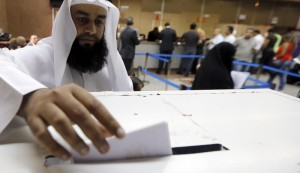
(AFP Photo)
The Shura Council’s legislative committee passed on Wednesday the political participation bill.
Council members decided to postpone sending the final bill to the Supreme Constitutional Court until the House of Representatives elections bill passes so both bills are sent together.
Some Shura Council members withdrew from the session on Tuesday, protesting the cancellation of a ban on religious campaigning during elections. The Shura Council’s legislative committee agreed on Tuesday to cancel the clause banning the use of religious slogans in Article 60 of the House of Representatives elections bill, reported the Egyptian Radio and Television Union.
Opposition movements rejected the changes to the article. The Misr Al-Qawia Party condemned the act in an official statement released on Wednesday. Party head Abdel Moneim Abul Fotouh stated that the use of religious slogans in electoral campaigning is unacceptable.
“The Islamic religion cannot be used as a tool to harvest electoral votes,” Abul Fotouh said in a personal tweet.
The Al-Tayar Al-Masry Party also released a statement denouncing the changes applied to the political participation bill and removing the ban on religious campaigning. The party provided a list of articles it rejects in the bill.
It stated that Article 10 of the political participation bill allows using religious slogans in electoral campaigning as well as allowing campaigning inside houses of worship. Article 31 gives the president the right to postpone, shorten or divide elections into rounds. Article 50 states that those who do not cast their votes in the elections are to be punished by an EGP 500 fine.
Al-Tayar Al-Masry member Abdel Rahman Haridy stated that he withdrew from the session during the discussion of the article allowing religious campaigning. He said that members of the Al-Wafd Party, the Egyptian Social Democratic Party (ESDP) and the Ghad Al-Thawra Party also withdrew alongside other independent members.
Shehab Wagih, spokesperson of the Free Egyptians Party, described the article as setting the base for a theological state. “From now on, the struggle will no longer be political, but religious,” he said.
Wagih stated that the Islamists resorted to this option because they are “politically bankrupt”.
Alaa Abul Nasr, secretary general of the Building and Development Party (BDP), Al-Jamaa Al-Islamiya’s political wing, said that the “secular parties” are rejecting the article because it goes against their methodology. “Their methodology requires them to completely separate between religion and politics,” Abul Nasr said. “Our methodology requires that we do the opposite.” Abul Nasr denied that the article breaches the constitution in any way.
Mohamed Nour Farahat, constitutional expert and ESDP leader, stated that the article is unconstitutional. “In my point of view, it breaches several articles of the constitution including articles 8 and 55,” Farahat said.
Article 8 reads the state provides justice, equality and freedom. “Allowing religious campaigning goes against religious equality,” Farahat said.
Article 55 says that the state ensures the validity, neutrality and integrity of the elections. Farahat said that involving religion in electoral campaigns negates the element of neutrality.
The political participation bill and the House of Representatives elections bill together make up the required legislation governing the upcoming elections for the lower house of parliament.
After the Shura Council passes them, the bills will be sent to the Supreme Constitutional Court to ensure their constitutionality. If the laws are found constitutional, Morsi will then call for elections, which are expected to be held next October.



